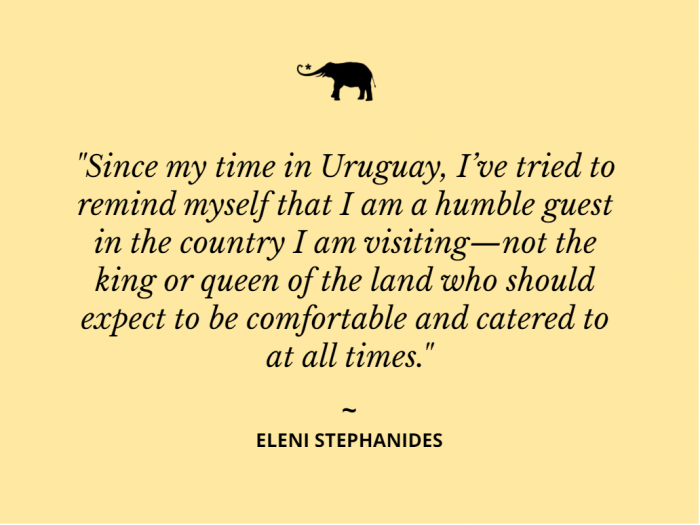
“One of the gladdest moments of human life is the departure upon a distant journey into unknown lands. Shaking off with one mighty effort the fetters of habit, the leaden weight of routine, the cloak of many cares and the slavery of home, man feels once more happy.” ~Richard Burton
~
The year 2013 for me was one filled with excitement, discomfort, novelty, and growth.
That was the year I moved to Montevideo, Uruguay, to teach English, become fluent in Spanish, and immerse myself in another culture.
Drinking mate (a hot beverage, served in a gourd-like container that in Uruguay is more popular than coffee or tea) with my Uruguayan housemates, negotiating with a robber in Spanish, and taking buses across the city on a rainy day in pursuit of a home for five scraggly newborn kitten were among the experiences that made it so.
Twice a week, I rode my bike over cobblestone roads, passing street art, pickup soccer games, and panaderias, until finally arriving to the small dirt side street with colonial-style houses, where the two brothers whom I taught English resided. The barks of the neighborhood dog, Appa, both signaled my arrival and made the presence of a doorbell unnecessary.
“Where are you from?” the vendors often asked me as they handed me a colorful bounty of tomatoes at the local outdoor street markets (or ferias as they called them). When I told them California, many would light up and exclaim that they loved the Red Hot Chili Peppers.
Carnival celebrations added music and color to the streets during the month of February, with mesmerizing costumes, ornate masks, brightly painted faces, street stages called “tablados,” and spirited drumming vivifying the parades.
Fast forward seven years, Netflix had a new show out called “Emily in Paris,” which I binged while sheltering in place.
Though the gorgeous scenes of Paris were a decadent treat for the eyes, watching Emily gallivant around the city and treating it like her playground brought up mixed feelings for me.
I wondered where her curiosity was. Had she stopped to wonder how the croissant she’d just inhaled (after Instagramming it to her followers) was prepared?
Did she know the history of the statue she’d just posed in front of?
Had she spent more than an hour in a French class attempting to learn the language?
Maybe I’m coming down a little hard on Emily. Maybe she just wanted to have fun, and I won’t fault her for that. We only have one life, and all of us should get to choose how we spend it.
Still, while it’s by no means a requirement, I do think some level of curiosity and humility—a two-way exchange (see my article here about cultural appropriation)—are important and can be valuable when exploring another country.
Watching “Emily in Paris” had me questioning my own habits while living abroad in South America.
During my time in Uruguay, I truly did seek to immerse myself, and in many ways did respect the culture. I spoke the language for one and was always eager to learn more and expand my vocabulary, listening intently when a student or housemate taught me a new word or phrase.
I talked to the locals and absorbed their experiences, learning also of the current issues besieging the country: among them the pasta base drug problem afflicting their youth, and the current economic climate—wherein many people in Uruguay were well-off, but few were super rich.
Much time was spent educating myself on the country and its culture: about their president, Mujica, the poorest president in the world who lived in the countryside tending flowers with his wife, about the history of the Tupamaros, and about the founding of Uruguay centuries ago by Portuguese settlers.
I read the fine print on the displays at museums, instead of just snapping pictures of the most colorful exhibits to post on my Instagram. Lovely details from some of them remain in my mind, including a black marble sculpture of a mother and her baby (called “Maternidad”) wherein the baby rested against its mother’s chest, and the mother’s arm became the baby’s torso; they were bound with no separation.
Still, there were ways in which I could have been more patient, tolerant, and understanding.
I felt frustrated by the diet (meat and carb heavy, with few veggie options) for one. The misogyny in the form of constant catcalling— which had me feeling uncomfortable walking down the street on my own as a woman at any time of day—also frustrated me. So did the treatment of the animals and, at times, homophobic attitudes (not as prevalent as in some other countries, but still undeniably present to a certain degree).
That the trash system was run by horses made me sad for the animals. I missed the food back home—the multitude of ethnic cuisines, the vegetable options, the IPAs—as well as both the variety of roasts and the care put into each cup of coffee at countless bay area cafes.
I struggled with adjusting to the humidity; I even once defended the United States when my Uruguayan girlfriend at the time spoke condemningly of it. I was quick to separate myself from the actions of our country’s founders. My knee-jerk reaction was to distance myself from that legacy.
And when my landlord swept newborn kittens into a black garbage bag after a stray cat had given birth in our backyard barbecue pit, my mind immediately (perhaps unfairly) jumped to: “Why doesn’t this culture care about its animals?”
In moments like these, I wish I could have called to mind Clifton Fadiman’s words: “When you travel, remember that a foreign country is not designed to make you comfortable. It is designed to make its own people comfortable.”
I think about how historically, instead of respecting the culture and practices of the Native Americans, our colonizer ancestors violently replaced them with their own.
No evidence points to their having thoughtfully compared their customs with those of the indigenous people. Rather than considering the potential outcome of their way of doing things, they blazed on through, certain of the superiority of their own values and forcefully imposing them.
As Raj Patel wrote in Inflamed, “To be clear, colonialism isn’t simply the physical occupation of land. It is a process, an operation of power in which one cosmology is extinguished and replaced with another. In that replacement, one set of interpretations about humans’ place in the universe is supplanted.”
I don’t mean to place any American who shows arrogance or privately judges a foreign custom on the same level as barbarians who commit massacre.
What I do hope to bring attention to though is that the seeds of this pompous and aggressive behavior originated with one group believing wholeheartedly in the superiority of their ways.
That said, when you find yourself starting to do this, consider the following:
1. Consider alternative explanations.
One strategy I’ve found that helps temper my righteousness is coming up with an alternative explanation for whatever judgment I’ve just made in my head.
For instance, when it comes to the animal issue—maybe the country lacks the infrastructure and resources to take care of every stray creature. I didn’t have to agree with my landlord’s decision to leave the bag of kittens on the street (or sit back and watch him do it without intervening), but I also didn’t have to generalize the actions of one Uruguayan onto their entire culture.
When men yell things on the streets—many of the Uruguayan girls are flattered by the catcalling. One even said that she feels ugly when she goes to the United States, where guys don’t shout compliments as often. The fact that what many American women take to be respectfulness and Uruguayan women construe as disinterest shows how subjective everything is.
I could have tried to understand after Mariela (my then girlfriend) denounced our country, rather than get defensive. I could have put myself in her shoes and acknowledged that citizens of countries outside the United States have every reason to be resentful of us. Even though I may not have directly colonized or performed brutality on indigenous people, I am part of a system whose ancestors did—and like it or not, I directly benefit from the past actions of a colonizer nation.
2. Similar to the point above, also pay attention to and embrace the positives of the culture.
I embraced how the meat at Mercado del Puerto, home to over a dozen meat restaurants inside Ciudad Vieja’s former railroad station, wasn’t raised with numerous hormones inside factory farms.
I loved how the presence of grass was not a requirement for playing of soccer; people would kick a ball around on the street, sand, or anywhere with solid ground. Following the Candombe’s drum festival one night, one guy even took a soccer ball out of his backpack, after which we passed it around in the deserted streets.
I appreciated how in Uruguay, people tend to be remarkably kind—even toward strangers. After a thief tried to grab my backpack in Barrio Sur, resulting in my partially opened water bottle submerging the contents inside it, three good Samaritans (older ladies) helped me empty it out. They wiped down the drenched sundries. They unfolded books so that they could dry. They spent a solid half hour doing this, addressing me in a comforting and maternal way throughout.
3. Remind yourself that this country’s ways work for many of its people and have worked for centuries.
I know that this is far simpler in theory than in actual practice, and I’m no Zen role model for cultural acceptance, by any means. Examination of the homophobia, sexist attitudes, and environmental disregard in certain countries makes the advice “unilaterally respect other cultures” not always so easy to follow.
In general though, since my time in Uruguay, I’ve tried to remind myself that I am a humble guest in the country I am visiting—not the king or queen of the land who should expect to be comfortable and catered to at all times.
Rather, I can and should expect to make accommodations and sacrifices while there.
“Humility and silence are surely preferable to ignorance and imperiousness,” writes Lisa Halliday in her book, Asymmetry. This sentence doesn’t apply to all aspects of life, but to spending time within a culture that’s not your own, I believe it does.
Respect things as they are and seek to coexist with what is.
Afterwards, you might even find yourself slightly more amenable to another way of doing things. Maybe, you’ll even begin to question some of the customs and habits you’ve always considered inherent to who you are. Maybe you’ll find that more than anything, you were just performing them on autopilot.
Keep your eyes, hands, and senses open, with surrender to exactly what is happening (much of which may fall outside your comfort zone).
In my mind, there is much to be gained from this approach to travel—on both the visitor’s and the visited’s behalf.












Read 13 comments and reply